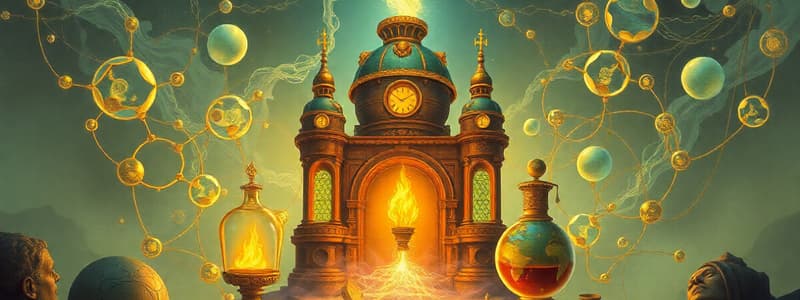Podcast
Questions and Answers
What term is used to describe carbon chains that can double back and form rings of atoms?
What term is used to describe carbon chains that can double back and form rings of atoms?
- Polymers
- Chains
- Cyclic compounds (correct)
- Bonds
Why is carbon considered a unique element in organic chemistry?
Why is carbon considered a unique element in organic chemistry?
- It can share four valence electrons. (correct)
- It is the only element that forms organic compounds.
- It can form only single bonds.
- It has high electronegativity.
What significant understanding of organic compounds was achieved in the mid-1800s?
What significant understanding of organic compounds was achieved in the mid-1800s?
- There was no significant change in organic chemistry.
- Carbon compounds were no longer studied.
- All organic compounds come from living organisms.
- Organic and inorganic compounds were fundamentally different. (correct)
Which of these is NOT a product that modern chemists can design using organic chemistry?
Which of these is NOT a product that modern chemists can design using organic chemistry?
What are the subatomic particles found in the nucleus of an atom?
What are the subatomic particles found in the nucleus of an atom?
What is the main focus of organic chemistry?
What is the main focus of organic chemistry?
Which aspect of carbon's electronic structure contributes most to its ability to form diverse compounds?
Which aspect of carbon's electronic structure contributes most to its ability to form diverse compounds?
What type of compounds are proteins, DNA, and carbohydrates classified as?
What type of compounds are proteins, DNA, and carbohydrates classified as?
Which scientist advanced the concept of valence in the 1850s?
Which scientist advanced the concept of valence in the 1850s?
Which statement about carbon compounds is accurate?
Which statement about carbon compounds is accurate?
What does the term 'valence' refer to in chemistry?
What does the term 'valence' refer to in chemistry?
Which of the following statements about carbon is true?
Which of the following statements about carbon is true?
What is an example of a substance that is not considered part of organic chemistry?
What is an example of a substance that is not considered part of organic chemistry?
What major concept was proposed by J.van’t Hoff and J.LeBel regarding molecular structure?
What major concept was proposed by J.van’t Hoff and J.LeBel regarding molecular structure?
Michel Chevreul is known for preparing soap using which two primary components?
Michel Chevreul is known for preparing soap using which two primary components?
Which of the following best defines 'ionic bonding'?
Which of the following best defines 'ionic bonding'?
What significant contribution did Torbern Bergman make in the 1600’s-1700’s?
What significant contribution did Torbern Bergman make in the 1600’s-1700’s?
Which statement reflects the early understanding of organic compounds?
Which statement reflects the early understanding of organic compounds?
Who is known as the father of organic chemistry for his achievement in 1828?
Who is known as the father of organic chemistry for his achievement in 1828?
What did the alchemical practices lead to in terms of laboratory development?
What did the alchemical practices lead to in terms of laboratory development?
What was the primary contribution of Hilaire Rouelle in the 1600’s-1700’s?
What was the primary contribution of Hilaire Rouelle in the 1600’s-1700’s?
According to Jons Jakob Berzelius, what was essential for organic compounds?
According to Jons Jakob Berzelius, what was essential for organic compounds?
Which of the following summarizes the impact of Michel Chevreul's work?
Which of the following summarizes the impact of Michel Chevreul's work?
What was one of the claims made by William Brande in 1848 regarding organic and inorganic chemistry?
What was one of the claims made by William Brande in 1848 regarding organic and inorganic chemistry?
What planetary characteristic distinguishes Jupiter from all other planets in the Solar System?
What planetary characteristic distinguishes Jupiter from all other planets in the Solar System?
Which statement about Mars is true?
Which statement about Mars is true?
What is a defining feature of Saturn?
What is a defining feature of Saturn?
What is the nature of Neptune as described?
What is the nature of Neptune as described?
What concept in organic chemistry allows for different arrangements of the same atoms?
What concept in organic chemistry allows for different arrangements of the same atoms?
Which planet is known for having the highest temperatures?
Which planet is known for having the highest temperatures?
Which of the following statements is incorrect regarding Mercury?
Which of the following statements is incorrect regarding Mercury?
What is the significance of molecular shapes in organic chemistry?
What is the significance of molecular shapes in organic chemistry?
What is the primary function of the nucleus in an atom?
What is the primary function of the nucleus in an atom?
Which particle has a mass that is significantly smaller than that of protons and neutrons?
Which particle has a mass that is significantly smaller than that of protons and neutrons?
What does it mean for two isotopes to have the same atomic number?
What does it mean for two isotopes to have the same atomic number?
What is the primary purpose of the wave function in quantum mechanics?
What is the primary purpose of the wave function in quantum mechanics?
How many electrons can an s orbital hold?
How many electrons can an s orbital hold?
Which of the following best describes the arrangement of orbitals in electron shells?
Which of the following best describes the arrangement of orbitals in electron shells?
What type of orbital is represented by the letter 'p'?
What type of orbital is represented by the letter 'p'?
What is the significance of the square of the wave function, ψ²?
What is the significance of the square of the wave function, ψ²?
Flashcards are hidden until you start studying
Study Notes
History of Organic Chemistry
- Alchemy, dominant before the 1600s, led to the production of pure compounds and various laboratory tools.
- Between the 1300s and 1500s, fractionation techniques for producing alcoholic beverages like whisky and brandy were developed.
- Isolation of organic compounds began, exemplified by acetic acid from vinegar and formic acid from ants.
Birth of Modern Chemistry
- In the 1600s to 1700s, Torbern Bergman distinguished organic from inorganic compounds, linking organic substances to the animal and vegetable realms.
- Hilaire Rouelle isolated urea from human urine, marking progress in organic chemistry.
- Antoine Lavoisier classified organic compounds consisting of carbon (C), hydrogen (H), nitrogen (N), and phosphorus (P), establishing a foundational framework.
- Jons Jakob Berzelius introduced the vitalism theory, proposing that organic compounds originated from a vital force in living organisms.
Developments in the 1800s
- Michel Chevreul created soap from animal fat and alkali, isolating fatty acids in the process.
- Friedrich Wöhler synthesized urea from ammonium cyanate, a landmark act considered the birth of organic chemistry.
- Edward Frankland advanced the concept of valence, shaping modern understandings of chemical bonding.
- Notable chemists like Stanislao Cannizzaro, A. Kekulé, and Emil Erlenmeyer contributed to understanding molecular weights and bonding structures.
20th Century Concepts
- The modern view of chemical bonding emerged with ionic and covalent bonding models proposed by W. Kossel and G.N. Lewis.
- Quantum mechanics contributed to understanding atomic structure, significantly transforming chemistry.
Importance of Organic Chemistry
- Organic chemistry focuses on the study of carbon compounds, a unique element due to its ability to form diverse bonds and structures.
- Carbon's electronic structure allows it to form four strong covalent bonds and create extensive chains and rings essential for organic compounds.
Atomic Structure and Electron Configuration
- Atoms consist of protons and neutrons in the nucleus, with electrons occupying orbitals.
- The lack of charge balance is established by equal numbers of protons and electrons.
- Isotopes are variations of elements with the same atomic number but different mass numbers.
- Orbitals (s, p, d, f) are regions around the nucleus where electrons are likely to be found, structured across different energy levels.
Isomerism
- Molecules can be arranged differently despite consisting of the same atoms, leading to isomerism.
- The three-dimensional nature of molecules influences their properties and functional behavior in organic chemistry.
Studying That Suits You
Use AI to generate personalized quizzes and flashcards to suit your learning preferences.




